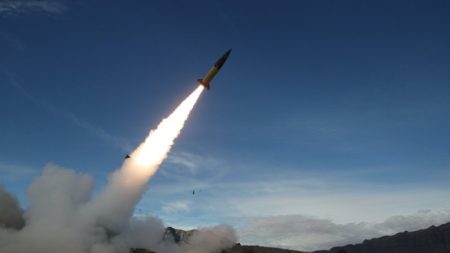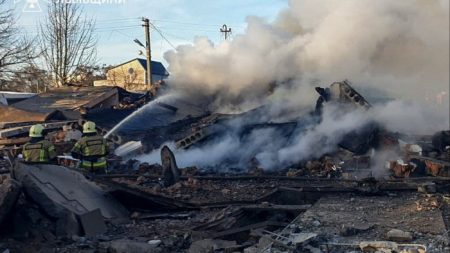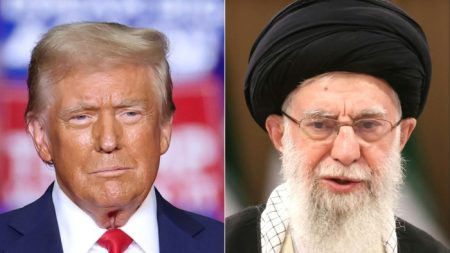Iran’s supreme leader Ayatollah Ali Khamenei has signalled a measured response to Israel’s attack on the Islamic republic rather than an immediate reprisal as Tehran tries to balance domestic expectations with the risk of escalating regional conflict.
Speaking a day after Israel launched three waves of strikes on Iran, Khamenei made a public speech, warning against complacency and suggesting the response would be measured.
“The viciousness of the Zionist regime should neither be overestimated nor underestimated,” Khamenei said, while adding that Israel’s “strategic miscalculations” should be countered.
Khamenei, the republic’s ultimate decision maker, refrained from issuing any direct threats of retaliation, instead saying that senior Iranian officials would determine how Tehran responded. “The manner of making the Zionist regime understand the power and resolve of the Iranian nation is up to our officials, who will take whatever action best serves this country,” he said.
Khamenei’s comments come amid concerns that the conflict between Israel, Iran and Iranian-backed militants is pushing the Middle East towards a full-blown war. They suggest the regime is keen to reassure Iranians that Israel’s strikes have not caused the level of damage initially feared.
In the early hours of Saturday, Israeli warplanes struck multiple military targets across three provinces in Iran, including Tehran. Israeli jets did not enter Iranian airspace, instead launching the missiles from Iraq, Iran said. The Israeli military said it targeted missile manufacturing plants and air defences, in retaliation for the ballistic missile barrage Iran fired at Israel three weeks ago.
The Israeli strikes killed four soldiers.
Prime Minister Benjamin Netanyahu said on Sunday that Israel’s air force had “attacked throughout Iran” and “severely damaged Iran’s defence capability and its ability to produce missiles”.
“The attack was precise and powerful and achieved its goals. This regime must understand a simple principle — whoever hurts us, we hurt him,” Netanyahu said at a ceremony to mark the Israelis killed since Hamas launched its October 7 attack that triggered the war. “This is the principle that has guided us until today and it is the principle that will motivate us later on.”
Iran’s initial reaction was to play down the impact of the strikes. On Saturday, the General Staff of the Armed Forces said the republic “reserved its legal and legitimate right to respond at an appropriate time”.
In a statement, it said Iran’s emphasis was on supporting a ceasefire in Gaza and Lebanon where Israeli forces are fighting Hamas and Hizbollah respectively; the militant groups are backed by the republic.
Israel’s strikes were in retaliation for an Iranian attack on October 1, when the republic fired 180 ballistic missiles at Israel. That was in response to Israel’s assassination of Hassan Nasrallah, the leader of Hizbollah, the Lebanese movement that is Iran’s most important proxy.
But the foes appeared to want to avoid an all-out war.
Israel’s government has remained largely silent about the attack on Iran, after Netanyahu banned his ministers from granting interviews on Saturday. Instead, the Israeli military was left to describe in vague terms the “precise strikes” on missile production sites and air defences and issue warnings of future attacks if Tehran retaliated.
The US had pressed Israel to avoid striking Iran’s nuclear sites or oil facilities as Netanyahu’s government prepared its response to the Iranian ballistic missile attack three weeks ago.
After Israel declared the assault over, the Biden administration said Israel’s response should mark the end of the latest cycle of attacks between the foes. The US has conveyed this message directly and indirectly to Tehran, the official said.
If Iran responds, Washington will defend and support Israel and “there will be consequences”, the official added.
On Saturday, in telephone conversations with his Egyptian and Qatari counterparts, foreign minister Abbas Araghchi said that “Iran will not hesitate to respond decisively and proportionately to any violation of its territorial integrity”, but added that any response would come at “an appropriate time”.
Iran’s armed forces claimed in the statement that a “significant” number of Israeli missiles were intercepted, while those that did reach their targets caused only “limited damage” to radar systems, some of which have already been repaired.
Iran’s air defence headquarters said that Israel had targeted military bases in Tehran, the south-western province of Khuzestan and the western province of Ilam.
Iranian state television minimised the impact of the strikes on daily life. In interviews on the street, residents either reported not hearing any explosions or downplayed the significance of the event.
The coverage — which often serves as an indicator of the Islamic republic’s messaging and strategic intentions — praised the country’s air defence systems, framing the attack as a victory for Iran and failure for Israel.
Arab states, including Iran’s traditional regional rivals the United Arab Emirates and Saudi Arabia, condemned Israel’s attack, underlining their fears of a regional escalation, with Riyadh describing it as a “violation of international laws”.
Read the full article here












